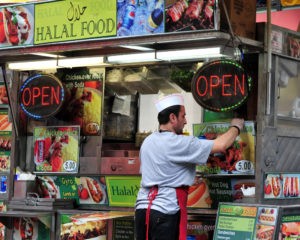Tajwid is an Arabic term that means “beautification.” It refers to the science and art…
What Should I Do? – Halal Meat
 I. Details about the situation:
I. Details about the situation:
Muhammad goes to a restaurant known for its delicious cheeseburgers and fried chicken; he heard from someone that the establishment might serve Islamically slaughtered meat and chicken. However, upon walking up to the counter, he notices that the employees working in the establishment do not appear to be Muslims. So, he asks the man taking the customers’ orders whether the meat and chicken are halal, to which the man replies “Yes, I think they are.” Is it permissible for Muhammad to eat meat and chicken at that restaurant? What should he do?
II. Background:
A Muslim has the right to eat foods of all kinds, except for meats (beef, chicken, etc.), animal fats, and their derivatives. Among the land animals, only sheep, goats, cows (including buffalo, yaks, and other bovines), deer, and camels are muhallal (halal or permissible after tadhkiya [1]). All birds are muhallal except for raptors (birds of prey) and scavengers (such as vultures, crows, and buzzards). When a bird flies, if it flaps more than it glides or soars, it is muhallal, and if it glides or soars more than it flaps, it is haram. A Muslim, male or female, must slaughter land animals and birds in the prescribed manner for the meat to be halal or permissible to consume. The Holy Quran states, “If you have faith in God’s revelations, eat the flesh of the animal which has been slaughtered with a mention of His Name. Why should you not eat such flesh when God has told you in detail what is unlawful to eat under normal conditions. Most people, out of ignorance, are led astray by their desires. Your Lord knows best those who transgress.”[2] For the Muslim purchaser, it is necessary that they have itminan or contentment that the meat they are acquiring is actually halal.
III. Ruling:
A Muslim must assume that any meat is haram or not permissible unless
• they know it was slaughtered according to Islamic rules (muhallal and mudhakka). A
Muslim knows meat is permissible if they slaughtered it themselves, witnessed its
slaughter, or have complete confidence in the person who is informing them that it is
muhallal and mudhakka. Halal labels on products purchased from non-Muslim markets
or lands are not valid for the establishment of permissibility. Instead, the person must
[sincerely] investigate to determine permissibility, or any other way that gives them
contentment, that it is mudhakka and [therefore] halal.
• it is procured from a Muslim. A Muslim may accept the meat as permissible (halal),
unless they have knowledge to the contrary, if the meat is in the possession of a
Muslim who states that it is halal or even acts in a way that implies that it is; the meat is
bought from a Muslim seller (such as a butcher, farmer, or shop owner); the meat is
ordered at a Muslim restaurant; or a Muslim host serves it. If a Muslim butcher,
restaurant owner, or host states that the meat is not halal, eating it is prohibited (haram) . Similarly, if a Muslim investigates and finds out that the meat provided by a Muslim
butcher, Muslim restaurant owner, or Muslim host is not halal, eating it is prohibited (haram).
• it is procured from a Muslim market. A Muslim market means a market or shopping
district where the stores are predominantly owned and frequented by Muslims, and
where a non-Muslim store is the exception. If meat is procured from a Muslim market, it
may be accepted as permissible (halal) even if the religion of the seller is not known,
unless there is knowledge to the contrary (in which case it is impermissible). However, if
the seller is known to be a non-Muslim, a Muslim may not automatically accept the meat
as halal.
• it is procured from a Muslim land, which means a place where most people are
Muslims. The rule of thumb for identifying such a place is that people call it a Muslim
country or a Muslim region. If meat is procured from a non-Muslim, the Muslim must
ascertain that it is in fact permissible (halal), and they may not take their (the
non-Muslim’s) word for it.
IV. Action:
Muhammad should not eat any of the meat or chicken from the restaurant given the circumstances. If the employee taking the orders is not a Muslim, then he cannot take his word that the meat and chicken are halal. Muhammad should seek other means to achieve contentment that the meat and chicken served at this, or any other restaurant, falls under one of the categories described above so he can be certain that it is halal.
1. Tadhkiya means the process of performing animal slaughter or capture so that it is permissible (halal) to eat.
2. The Holy Quran, 6:118119, Muhammad Sarwar translation.
(فَكُلُوا مِمَّا ذُكِرَ اسْمُ اللَّـهِ عَلَيْهِ إِن كُنتُم بِآيَاتِهِ مُؤْمِنِينَ/وَمَا لَكُمْ أَلَّا تَأْكُلُوا مِمَّا ذُكِرَ اسْمُ اللَّـهِ عَلَيْهِ وَقَدْ فَصَّلَ لَكُم مَّا حَرَّمَ عَلَيْكُمْ إِلَّا مَا اضْطُرِرْتُمْ إِلَيْهِ ۗ وَإِنَّ كَثِيرًا لَّيُضِلُّونَ بِأَهْوَائِهِم بِغَيْرِ عِلْمٍ ۗ إِنَّ رَبَّكَ هُوَ أَعْلَمُ بِالْمُعْتَدِينَ)
Related Posts
- Tajwid – A Guide to Quranic Recitation
- Video: I.M.A.M. at Home – In God’s Remembrance – Lessons from Sura al-Muzzamil
https://www.youtube.com/embed/d-pCv-6KSzQ Host: Shaykh Faiyaz Jaffer Chapter 73 of the Holy Quran offers us many unique insights…
- Video: Let’s Talk Religion: Ep. 11 – Servanthood to God in All Times – Advice of the Ahl al-Bayt (p)
https://www.youtube.com/embed/rFGZpqVoS7c Host: Shaykh Dr. Mehdi Hazari Episode Notes: A true servant of God is aware that life…

Leave a Comment:
You must be logged in to post a comment.